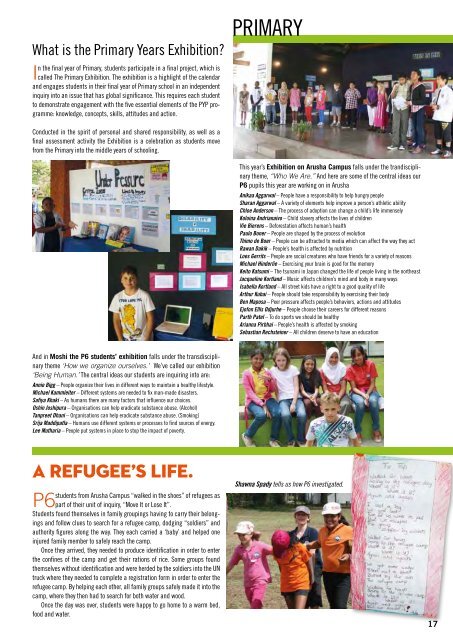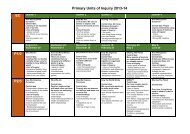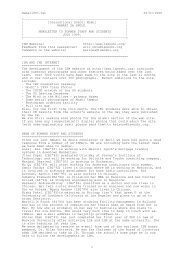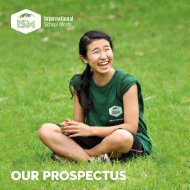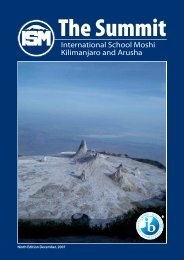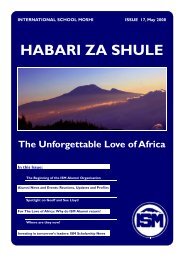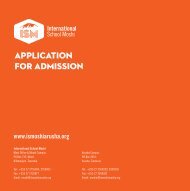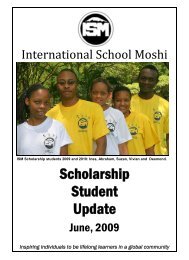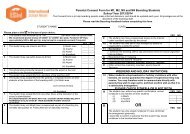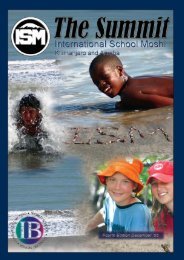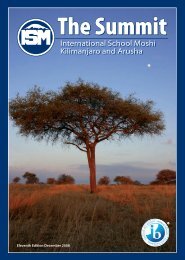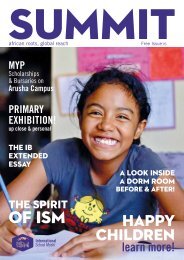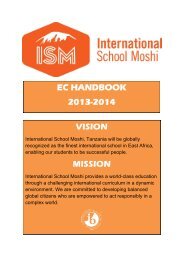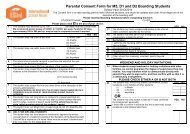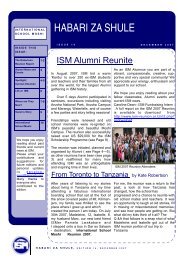June 2012 (5Mb) - International School Moshi
June 2012 (5Mb) - International School Moshi
June 2012 (5Mb) - International School Moshi
Create successful ePaper yourself
Turn your PDF publications into a flip-book with our unique Google optimized e-Paper software.
What is the Primary Years Exhibition?<br />
In the final year of Primary, students participate in a final project, which is<br />
called The Primary Exhibition. The exhibition is a highlight of the calendar<br />
and engages students in their final year of Primary school in an independent<br />
inquiry into an issue that has global significance. This requires each student<br />
to demonstrate engagement with the five essential elements of the PYP programme:<br />
knowledge, concepts, skills, attitudes and action.<br />
PRIMARY<br />
Conducted in the spirit of personal and shared responsibility, as well as a<br />
final assessment activity the Exhibition is a celebration as students move<br />
from the Primary into the middle years of schooling.<br />
This year’s Exhibition on Arusha Campus falls under the trandisciplinary<br />
theme, “Who We Are.” And here are some of the central ideas our<br />
P6 pupils this year are working on in Arusha<br />
Anikaa Aggarwal – People have a responsibility to help hungry people<br />
Sharan Aggarwal – A variety of elements help improve a person’s athletic ability<br />
Chloe Anderson – The process of adoption can change a child’s life immensely<br />
Koloina Andrianaivo – Child slavery affects the lives of children<br />
Vie Bierens – Deforestation affects human’s health<br />
Paulo Boner – People are shaped by the process of evolution<br />
Thimo de Boer – People can be attracted to media which can affect the way they act<br />
Rawan Dakik – People’s health is affected by nutrition<br />
Loes Gerrits – People are social creatures who have friends for a variety of reasons<br />
Michael Hinderlie – Exercising your brain is good for the memory<br />
Keito Katsumi – The tsunami in Japan changed the life of people living in the northeast<br />
Jacqueline Kortland – Music affects children’s mind and body in many ways<br />
Isabella Kortland – All street kids have a right to a good quality of life<br />
Arthur Kubai – People should take responsibility by exercising their body<br />
Ben Maposa – Peer pressure affects people’s behaviors, actions and attitudes<br />
Ejofon Ellis Odjurhe – People choose their careers for different reasons<br />
Parth Patel – To do sports we should be healthy<br />
Arianna Pirbhai – People’s health is affected by smoking<br />
Sebastian Rechsteiner – All children deserve to have an education<br />
And in <strong>Moshi</strong> the P6 students’ exhibition falls under the transdisciplinary<br />
theme ‘How we organize ourselves.’ We’ve called our exhibition<br />
‘Being Human.’ The central ideas our students are inquiring into are:<br />
Annie Bigg – People organize their lives in different ways to maintain a healthy lifestyle.<br />
Michael Kammleiter – Different systems are needed to fix man-made disasters.<br />
Safiya Khaki – As humans there are many factors that influence our choices.<br />
Oshin Joshipura – Organisations can help eradicate substance abuse. (Alcohol)<br />
Tanpreet Dhani – Organisations can help eradicate substance abuse. (Smoking)<br />
Srija Maddipatla – Humans use different systems or processes to find sources of energy.<br />
Lee Mutharia – People put systems in place to stop the impact of poverty.<br />
A refugee’s life.<br />
P6<br />
students from Arusha Campus “walked in the shoes” of refugees as<br />
part of their unit of inquiry, “Move It or Lose It”.<br />
Students found themselves in family groupings having to carry their belongings<br />
and follow clues to search for a refugee camp, dodging “soldiers” and<br />
authority figures along the way. They each carried a ‘baby’ and helped one<br />
injured family member to safely reach the camp.<br />
Once they arrived, they needed to produce identification in order to enter<br />
the confines of the camp and get their rations of rice. Some groups found<br />
themselves without identification and were herded by the soldiers into the UN<br />
truck where they needed to complete a registration form in order to enter the<br />
refugee camp. By helping each other, all family groups safely made it into the<br />
camp, where they then had to search for both water and wood.<br />
Once the day was over, students were happy to go home to a warm bed,<br />
food and water.<br />
Shawna Spady tells us how P6 investigated.<br />
17


